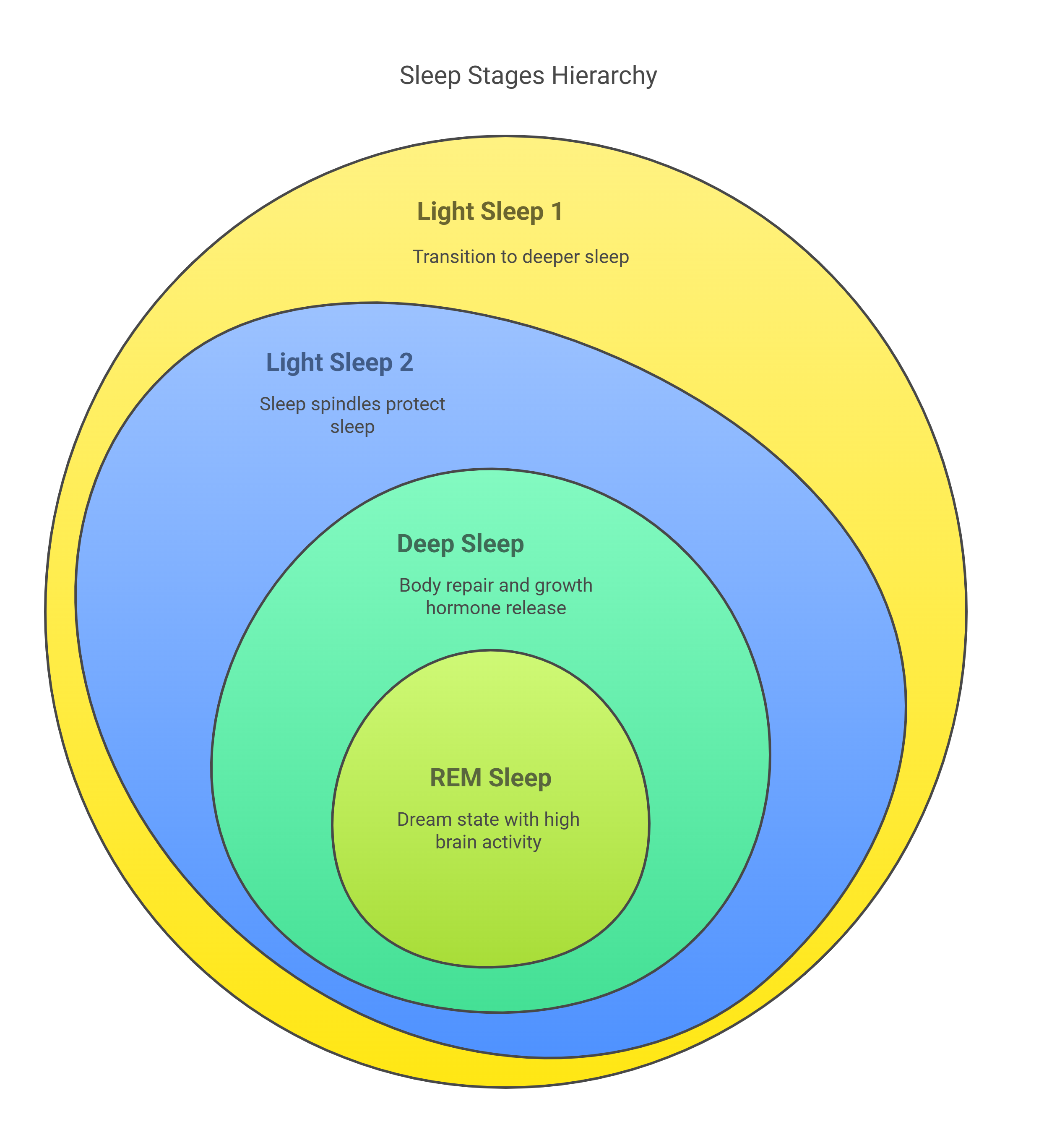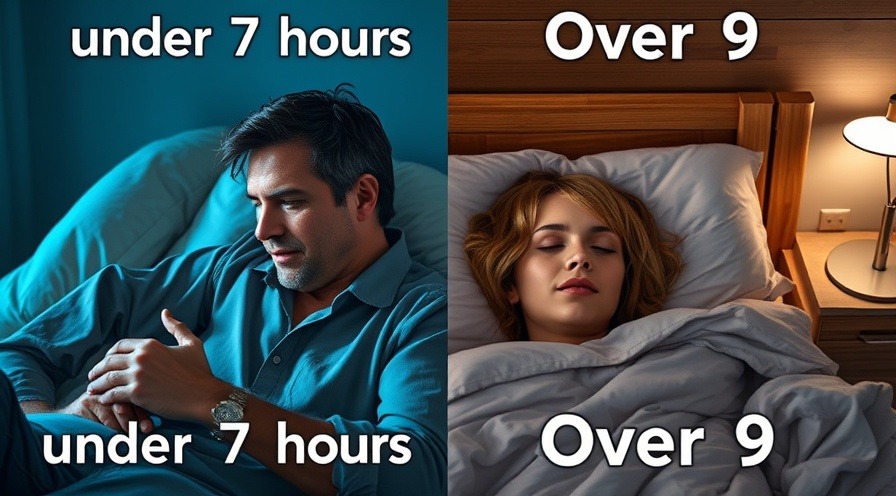
Understanding Sleep Cycles and Stages: A Guide to Restorative Sleep
Achieving restorative sleep is not simply about the number of hours spent in bed, but about how effectively the body and brain progress through the different stages of sleep. Sleep is structured into distinct cycles, each comprising multiple stages that perform critical physiological and neurological functions. Understanding these stages — NREM1, NREM2, NREM3 (Deep Sleep), and REM sleep — provides crucial insight into the mechanisms behind restorative rest and overall health.
The Structure of Sleep: Cycles and Duration
A typical night's sleep consists of 4–6 cycles, each lasting approximately 90 minutes (Carskadon & Dement, 2011). Each cycle includes both Non-Rapid Eye Movement (NREM) sleep and Rapid Eye Movement (REM) sleep. As the night progresses, the duration and composition of each stage shift, with deeper NREM sleep dominating the earlier cycles and longer REM periods appearing closer to morning.
NREM Stage 1: The Transition into Sleep
NREM Stage 1 is the lightest phase of sleep, marking the transition from wakefulness to rest. Characterized by slow eye movements and reduced muscle activity, this stage lasts only a few minutes (Iber et al., 2007). Brain activity begins to decelerate, but individuals can still be easily awakened. This phase serves as the entry point to more profound stages of sleep but does not offer substantial restorative benefits on its own.
NREM Stage 2: Light Sleep and Sleep Spindle Activity
NREM Stage 2 represents a deeper stage of light sleep, comprising approximately 50% of total sleep time (Dement & Kleitman, 1957). Body temperature decreases, heart rate steadies, and distinctive bursts of brain activity known as sleep spindles and K-complexes occur. Research suggests that sleep spindles play a role in memory consolidation and sensory processing regulation (Fogel & Smith, 2011).
NREM Stage 3: Deep Sleep and Physical Restoration
Also referred to as Slow-Wave Sleep (SWS) or delta sleep, NREM Stage 3 is essential for physical restoration and immune system strengthening. It is characterized by high-amplitude, low-frequency brain waves known as delta waves. During this stage, the body repairs tissues, builds muscle and bone, and enhances immune function (Dang-Vu et al., 2008). Deep sleep is critical for waking up feeling physically refreshed and restored.
REM Sleep: Cognitive Processing and Emotional Regulation
REM sleep is distinguished by rapid eye movements, heightened brain activity, and vivid dreaming. It typically occurs approximately 90 minutes after falling asleep and becomes longer with each successive cycle. REM sleep is crucial for emotional regulation, learning, and memory integration (Walker, 2009). Deficiencies in REM sleep have been linked to impaired cognitive performance and increased emotional instability.

Consequences of Disrupted Sleep Cycles
Interruptions to normal sleep architecture, whether through environmental disturbances, sleep disorders, or lifestyle factors, can have significant consequences. Disruptions can result in diminished deep sleep and REM sleep, leading to impaired memory consolidation, reduced physical recovery, weakened immune responses, and higher risks for chronic health conditions such as cardiovascular disease and diabetes (Medic, Wille, & Hemels, 2017).
Strategies to Optimize Sleep Cycles
To support optimal progression through the sleep stages, the following practices are recommended:
Maintain a consistent sleep-wake schedule, even on weekends.
Minimize exposure to blue light from screens at least an hour before bedtime.
Create an environment conducive to sleep, with a cool, dark, and quiet room.
Limit caffeine intake in the afternoon and evening.
Ensure daily exposure to natural daylight, particularly in the morning, to regulate the circadian rhythm.
Moderate alcohol consumption, which can disrupt REM sleep.
Conclusion
Understanding the intricate architecture of sleep highlights the importance of maintaining healthy sleep cycles for comprehensive physical, cognitive, and emotional well-being. Each stage of sleep plays a distinct and critical role. Prioritizing habits that protect and enhance natural sleep architecture is essential for achieving truly restorative sleep and promoting long-term health.
Citations:
Carskadon, M. A., & Dement, W. C. (2011). Normal human sleep: An overview. In M. H. Kryger, T. Roth, & W. C. Dement (Eds.), Principles and Practice of Sleep Medicine (5th ed.).
Iber, C., Ancoli-Israel, S., Chesson, A. L., & Quan, S. F. (2007). The AASM manual for the scoring of sleep and associated events: Rules, terminology and technical specifications. American Academy of Sleep Medicine.
Dement, W., & Kleitman, N. (1957). The relation of eye movements during sleep to dream activity: An objective method for the study of dreaming. Journal of Experimental Psychology.
Fogel, S. M., & Smith, C. T. (2011). The function of the sleep spindle: A physiological index of intelligence and a mechanism for sleep-dependent memory consolidation. Neuroscience & Biobehavioral Reviews.
Dang-Vu, T. T., et al. (2008). Spontaneous neural activity during human slow wave sleep. Proceedings of the National Academy of Sciences.
Walker, M. (2009). The role of sleep in cognition and emotion. Annals of the New York Academy of Sciences.
-
Medic, G., Wille, M., & Hemels, M. E. (2017). Short- and long-term health consequences of sleep disruption. Nature and Science of Sleep.
 Add Row
Add Row  Add
Add 




 Add Row
Add Row  Add
Add 

Write A Comment